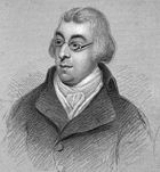
Isaac D'Israeli
Isaac D'Israeli was born in Enfield, Middlesex, England, in May 1766, his father being a Jewish merchant who had emigrated from Venice a dozen or so years previously. He received much of his education in Leiden and as early as his sixteenth year began his literary career with some verses to Dr. Johnson. He was the father of the British prime minister, Benjamin Disraeli.
Curiosities of Literature (1791-1834)
- Candour is the brightest gem of criticism
- Literary Journals
- The wisdom of the wise, and the experience of ages, may be perpetuated by quotation.
- Quotation
- Whenever we would prepare the mind by a forcible appeal, an opening quotation is a symphony preluding on the chords those tones we are about to harmonize.
- Quotation
- If the golden gate of preferment is not usually opened to men of real merit, persons of no worth have entered it in a most extraordinary manner.
- Royal Promotions
- To bend and prostrate oneself to express sentiments of respect, appears to be a natural motion
- Modes of Salutation, and Amicable Ceremonies, Observed in Various Nations
- The negroes are lovers of ludicrous actions, and hence all their ceremonies seem farcical.
- Modes of Salutation, and Amicable Ceremonies, Observed in Various Nations
- Plagiarists, at least, have the merit of preservation.
- Of Suppressors and Dilapidators of Manuscripts
- Mediocrity can talk, but it is for genius to observe.
- Men of Genius Deficient in Conversation
- There is such a thing as Literary Fashion, and prose and verse have been regulated by the same caprice that cuts our coats and cocks our hats.
- Literary Fashions
- Every production of genius must be the production of enthusiasm.
- Solitude
The Literary Character, Illustrated by the History of Men of Genius (1795-1822)
Originally published as An Essay on the Manners and Genius of the Literary Character- A work, however, should be judged by its design and its execution, and not by any preconceived notion of what it ought to be according to the critic, rather than the author.
- Introduction
- After the golden age of Latinity, we gradually slide into the silver, and at length precipitately descend into the iron.
- Ch. III
- The poet and the painter are only truly great by the mutual influences of their studies, and the jealousy of glory has only produced an idle contest.
- Ch. III
- Theories of genius are the peculiar constructions of our own philosophical times; ages of genius had passed away, and they left no other record than their works; no preconcerted theory described the workings of the imagination to be without imagination, nor did they venture to teach how to invent invention.
- Ch. IV
- An excessive indulgence in the pleasures of social life constitutes the great interests of a luxuriant and opulent age
- Ch. VIII
